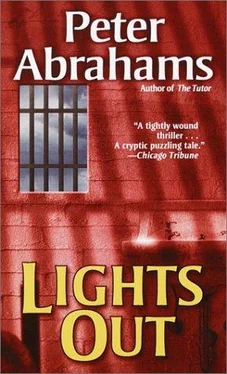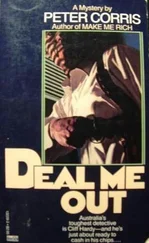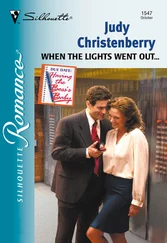“Pasta salad okay?” Jack asked, reaching for the phone. It buzzed before he could pick it up. He answered, listened, then rose and began pacing back and forth as far as the phone cord permitted, as though it were a leash. “That wasn’t our agreement,” he said. “They’re asking the impossible.” He listened, paced. “You’d better not be,” he said, his voice rising. Eddie could hear a tiny voice protesting on the other end. Jack hung up.
He glanced at Eddie, stopped pacing, composed himself. “Everything you’ve read about those pricks is true,” he said. “Just like bloodsuckers except they do it for pleasure. The money has nothing to do with it.”
“What pricks?”
“Wall Street pricks.” Jack snapped off his tie. He quickly undressed down to boxer shorts and knee-length socks, threw open a huge closet full of clothes. His body had grown top-heavy, his legs thinner. They were trembling slightly. He selected a new shirt, new tie, new suit, all of which looked almost identical to what he’d had on before, and began putting them on. Eddie followed every move, fascinated as a neophyte allowed in the master’s studio; or like a boy watching his father.
“Got to pass on lunch,” Jack said, knotting his new tie in a quick fluid pinwheel of navy and crimson. “Just order up whatever you want. Or call Hector, he’s the concierge. I’ll be back as soon as I can.” He hurried through the bedroom door, came right back. “It’s great to have you here,” he said. “Just great. We’ll celebrate tonight.” He left, returned again. “Sorry I have to run off-I’m so excited about this I can’t tell you.” He went, came back once more. “Don’t bother answering the phone-the machine’ll take it.” Then he was gone.
Eddie sat on the gilded chair in Jack’s bedroom. He didn’t order food because he wasn’t hungry, didn’t drink from the minibar because he’d drunk too much at L’Oasis, didn’t go out because he was afraid he might have trouble getting back in. To make himself useful, he picked Jack’s suit off the floor and carried it to the closet. He folded the pants, hung them on a wooden hanger, slid the jacket on top. He was about to hook the hanger over the rail when he remembered the check Jack had stuck in the inside pocket. He reached for it out of curiosity, just wanting to see.
It was a check drawn on the Banque de Geneve et Zurich, made out to Windward Financial Services, signed by Karen de Vere. The amount was $230,000. Eddie put it back.
The phone rang. Eddie didn’t pick it up. A voice said: “Mr. Nye. This is the billing department. Please call to discuss your account at your earliest convenience.” Eddie returned to the closet and looked at the check again.
He went into the sitting room, sat down on the couch where Karen de Vere had been. The cushions were still warm from her body; very slightly, but he could feel it. There were a lot of papers spread out on the coffee table. Some bore the letterhead of Windward Financial Services, some were the prospectuses of companies listed on the stock exchange, some had nothing on them but more numbers and abbreviations. Going through them, Eddie discovered a glossy brochure with Jack’s picture on the cover.
Jack was standing in front of 222 Park Avenue: the number was visible behind him. His hair was a little darker and thicker, his face a little darker and thinner, and he was smiling his smile. Eddie opened the brochure and began reading.
He learned a lot about his brother: how he was the president and founder of Windward Financial Services, one of the top-ten small financial consultancies in the nation, according to Crain’s New York Business (1990); how before that he had been the president and founder of J. M. Nye and Associates, a private investment firm that had specialized in trading high-yield bonds in the eighties, and had been acquired by a Belgian conglomerate (1988); how he had houses in Connecticut and Aspen; how he and his wife were skiers and golfers; how he’d graduated from USC with a degree in engineering.
Eddie stopped right there. He checked the graduation date: three years after the summer at Galleon Beach, which was when Jack would have graduated had he stayed in school.
But he hadn’t, had he? He’d left during his freshman year. Maybe he’d gone back, somehow made up the work he’d missed, graduated on schedule. Then Eddie recalled that Jack hadn’t left USC, exactly. He remembered the letter he’d found in Jack’s cabin at Galleon Beach, remembered what he hadn’t understood at the time and had almost forgotten: Jack had been expelled, permanently.
Meaning what? He didn’t know; didn’t know enough about how the world worked to even guess. He flipped on the TV. Wile E. Coyote lost his balance and fell off a cliff.
Although he had never been to France, Eddie dreamed he was in a French cafe. The elements of the dream: a little cup of the type Karen de Vere had held in her lap-in his dream he remembered it was called demitasse; snails dripping with garlic butter; blue smoke. He smelled smoke-even as he smelled it wondering if the smell had triggered the dream: didn’t dreams pass in seconds? — and opened his eyes.
It was dark. He lay on the couch in the sitting room of Jack’s suite at the Hotel Palazzo. The night glow of the city came through the window. The only other light was a red cigarette end moving back and forth along the opposite wall.
“Jack?”
The tiny red light was still. “Did I wake you?”
“What time is it?”
“Late. Sorry.”
“No problem. Did you sort out whatever it was?”
“Partly.”
The red light began moving again, back and forth.
“Do you live here, Jack?”
“It’s where I lay my weary head.” No mention of Aspen or Connecticut.
Eddie sat up. The smell was irresistible. “Got another cigarette?”
“You smoke?”
“Trying to quit. It’s prong one of my three-pronged plan.”
There was a soft smack on the coffee table-the cigarette pack; and a softer one-the matches. Eddie lit up.
“I give up,” said Jack.
“About what?”
“Prongs two and three.”
“Steam bath, which I haven’t had yet. And take nothing with me.”
“Did you?”
“I took my sneakers,” Eddie said. But he knew the break hadn’t been as clean as that. There was El Rojo’s hundred dollars, for starters. That had led to Sookray and Senor Paz. Then there was Prof’s charcoal drawing. That had led to Tiffany, who was in contact with Sookray. He hadn’t made a clean break at all; his old community reached out for him.
“Still wear a ten?” Jack asked.
“Yeah.”
“There’re boxes of tens around here somewhere. Jogging, tennis, loafers, Christ knows what else. I’ve got this personal shopper, don’t ask me why. Take what you want.”
The red-tip glow kept moving, back and forth.
Eddie said: “You got rich.”
Jack made a sound, half laughter, half choking on cigarette smoke. “Rich? What’s rich?”
“This place. Boxes of shoes. Personal shopper, whatever that is.” A check for $230,000 left in a jacket on the floor.
“That’s not rich, Eddie. Rich is never having to worry about money. Never having to think about it. Just living in it, like the air you breathe.”
“Is Bobby rich?”
“Bobby?”
“Falardeau. He says he’s set for life.”
The red light stopped, brightened, moved on.
“You went home?”
“Yeah.”
“Saw Bobby?”
“And Vic.”
“What made you do that?”
“Bobby I ran into. Vic… I don’t know.”
“He’s a pathetic drunk.”
“The whole town’s kind of pathetic now.”
Читать дальше












